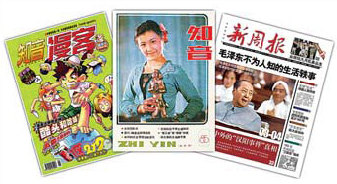
 |
|
Zhiyin's first edition (middle) was launched in 1985, with other popular publications from the Zhiyin Media Group. |
He was promoted as editor of the magazine in 1981. It was an interesting and special period as that was the time when Chinese society was just stepping out of the shadow of the "cultural revolution" (1966-76) and embracing the reform and opening-up policy.
With a strong nose for news, Hu sensed a gap in the publication world - the population, which had been living under a decade of political pressure, was awakening from the chaos, and trying to reconnect their broken human feelings, love and curiosity toward life.
Most magazines and newspapers then focused mainly on politics.
But increasingly, like the one where Hu led, had started to allocate space for external contributors who wrote about other topics.
The articles, mostly true stories about family relationship and love, immediately captured readers' hearts. "The letters began to pile up in my office, feedbacks about the stories kept pouring in," Hu recalls.
"Many readers shared their stories or sought advice to solve the problems they faced. I realized then that there was a huge demand for such a platform for the readers," says Hu.
He clearly remembered a shocking local news story about a young college student who cut off his finger after a girl rejected his advances.
"It's no big deal today, but during those days it was," says Hu.
He was not the first one who discovered the potential market. In 1983, a magazine named Family was released in Guangdong province and became very popular. Another magazine titled Readers, China's equivalent of Reader's Digest, caught on soon all over China.
"Those publications proved that my intuition was right and gave me the courage to start my plan as soon as possible," says Hu. He started to lobby the local Workers' Union and the Women's Federation for support.
The first step was to called on members of the public to suggest a name for the new publication.
"The name Zhiyin jumped out from hundreds of submissions. It literally means a bosom friend, which accurately represents my hope for the magazine - to get close to readers, to real people and to their hearts," says Hu.
But having no publishing nor marketing experience, the learning curve was steep and the road to success filled with unanticipated challenges.
"I took it for granted that the new magazine would be financially supported by the local government," says Hu. "I was wrong."
Although owned by the Women's Federation, Hu had to start from scratch.
He received 30,000 yuan ($4,820) as startup capital, and a loan of 70,000.
"Sounds like a lot of money during that time? Indeed, but we had to take care of everything including 3,000 yuan to set up a telephone," says Hu.
Based on preliminary estimates, they had to sell 400,000 magazines to break even. "I felt a great pressure and thought of quitting," Hu says.
The anchor story of the first edition was on arranged marriage, which was common then. "I was confident that the magazine would not disappoint readers."
Hu used many distribution channels. Besides sending to post offices and railway stations, the staff delivered the magazines themselves by bicycles to the emerging newsstands.
Soon, many retailers and book dealers knocked on the door of Hu's office to seek distribution rights. Hu was successful.
|
 |
 |
 |